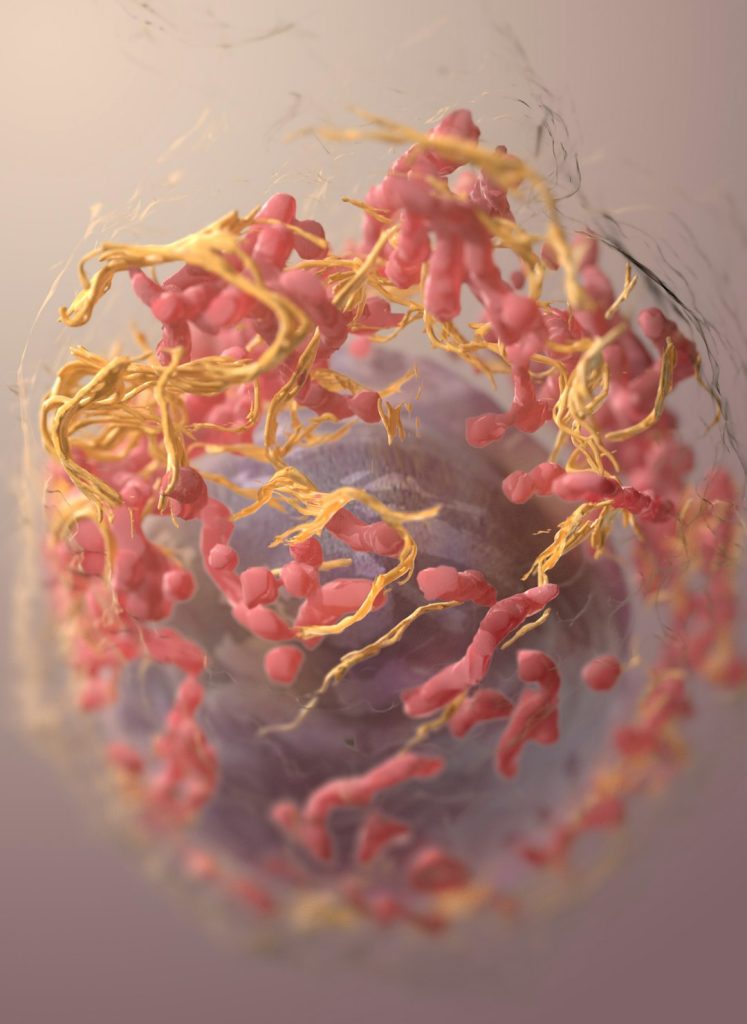How H. pylori impacts your Stomach’s Lymphatic Tissue
Knowing how H. pylori infections connect to MALT lymphoma is key for anyone affected by this rare cancer. MALT lymphoma, short for Mucosa-Associated Lymphoid Tissue Lymphoma, specifically affects the stomach’s lymphatic tissue and usually ties in with the presence of H. pylori, a common bacterial infection. Interestingly enough, tackling H. pylori early on can often lead to major remission of MALT lymphoma, sometimes doing away with the need for further treatments.
This document unravels the influence of H. pylori on stomach health, looks into natural treatments, and offers comfort and support for those looking to manage this condition. Let’s see how a proactive approach to H. pylori treatment can ignite hope and heal.
What is MALT Lymphoma?
MALT lymphoma, or Mucosa-Associated Lymphoid Tissue Lymphoma, is a type of cancer originating from lymphatic tissue, mainly in the stomach. It’s known as an extranodal marginal zone B-cell lymphoma because it often shows up outside the lymph nodes, in tissues like the stomach lining.
The development of this lymphoma is closely linked with H. pylori bacteria. When H. pylori sets up camp in the stomach, it can trigger an immune response that leads to lymphoid tissue piling up. This can eventually turn into harmful lymphoma cells.
Spotting and dealing with H. pylori infections early can be crucial in managing, and sometimes even reversing, the progression of MALT lymphoma, which highlights the necessity of understanding the relationship between infections and cancer. Stick with effective H. pylori treatment to lower risks and boost remission of MALT lymphoma.
Symptoms and Diagnosis
MALT lymphoma can be tricky to pinpoint because it often brings vague symptoms. You might notice abdominal discomfort, indigestion, or even gastrointestinal bleeding. Some folks might experience unexplained weight loss or fatigue, though these are a bit less specific.
Since these symptoms often overlap with other stomach issues, getting a precise diagnosis needs thorough medical check-ups. Usually, diagnostics kick off with an endoscopy for direct peeks and biopsies of the stomach lining. A detailed look at biopsy samples confirms whether MALT lymphoma is present. Plus, we often test for H. pylori since it’s closely tied to this lymphoma. CT scans and other imaging might be used to check the disease’s spread.
Spot-on diagnosis helps in the timely treatment of H. pylori, which can often lead to MALT lymphoma remission, potentially sidestepping more intense cancer treatments.

Treatment Options Overview
When dealing with MALT lymphoma, treatment mainly hinges on the stage of the disease and if H. pylori is in the mix. If H. pylori is found, the first line of action is usually antibiotics to tackle the bacteria.
This strategy often leads to a significant remission of MALT lymphoma, considering the bacteria’s a big factor in the disease. If clearing H. pylori doesn’t bring remission, or if the lymphoma’s more advanced, then jumping to other treatments like radiation, immunotherapy, or chemotherapy might be necessary.
Lately, there’s a lot of buzz around natural treatments and supplements that can help bolster immune function and manage symptoms better. It’s vital for patients to team up with healthcare providers to craft a personalized treatment plan that comprehensively tackles MALT lymphoma.
H. pylori’s Role in MALT Lymphoma
H. pylori, while common, has a notable impact on stomach health and is a known precursor to MALT lymphoma. These bacteria take hold of the stomach lining, leading to persistent inflammation and an amplified immune response.
Over time, lymphoid tissue can grow and transform into malignant cells, contributing to MALT lymphoma. Beyond lymphatic cancer, H. pylori is tied to other stomach issues like ulcers and gastritis. The ongoing presence of H. pylori can impede the stomach’s functionality, causing bloating, nausea, and abdominal pain.
Addressing this infection is essential for reducing MALT lymphoma risk and boosting overall gastric health. By effectively managing H. pylori with antibiotics and maybe natural remedies, you can help push MALT lymphoma into remission and improve digestive well-being.
Link Between Cancer and H. pylori
The connection between cancer and H. pylori is especially clear with MALT lymphoma. H. pylori is a crucial factor in this type of cancer. It sparks chronic inflammation in the stomach lining, creating a setting ripe for abnormal cell growth. This ongoing immune response leads to lymphoid tissue building up, which may turn malignant over time. H. pylori is also linked to a greater risk of other gastric cancers, like stomach cancer.
Its persistence in the gastric area makes it a critical target for intervention. Clearing H. pylori aids in getting MALT lymphoma into remission and cuts down on overall gastric cancer risks. So, understanding and managing H. pylori infections are vital for stopping cancer progression and ensuring long-term gastrointestinal health.

Immune Response to Infection
The immune response to H. pylori is crucial in MALT lymphoma’s development. As H. pylori invades the stomach lining, the body’s immune system kicks in to fend off the bacterial threat. This involves gathering immune cells, which sparks inflammation and leads to lymphoid tissue forming in the gastric mucosa.
Though initially protective, long-term H. pylori irritation can cause persistent inflammation that might transform normal cells into malignant ones. Addressing H. pylori infections promptly is essential. By removing the bacterial trigger, it often results in MALT lymphoma going into remission.
Understanding the immune response in this case is key to creating effective treatments that not only target the infection but also reduce the risk of cancer growth in lymphatic tissue.
Treating H. pylori in MALT Lymphoma
Properly treating H. pylori is central to managing MALT lymphoma, particularly early on. The go-to treatment comprises antibiotics and acid reducers, often called triple therapy. This combo aims to knock out the bacterium, ease gastric inflammation, and heal the stomach lining. Successfully clearing H. pylori can bring MALT lymphoma into remission, potentially sidestepping more intense treatments.
Traditional approaches aside, there’s also a budding interest in natural treatments that boost immune health and help tackle H. pylori. Herbal supplements and probiotics are often considered as complementary tactics to improve outcomes. But, it’s super important to get advice from healthcare providers to ensure these alternatives are used safely and effectively. Tackling H. pylori infections head-on can enhance stomach health and lower the risk of cancer progression in lymphatic tissues.
Achieving Remission of MALT Lymphoma
Seeing MALT lymphoma go into remission usually turns on how successfully you tackle H. pylori infections. For lots of patients, clearing this bacterium triggers significant regression or complete remission of the lymphoma, showing the vital role H. pylori plays in the disease. Following treatment, regular check-ups are crucial to monitor gastric health and confirm that malignancy stays at bay.
If lymphomas persist despite clearing up H. pylori, other options, like targeted radiation or immunotherapy, may be explored to eliminate lingering cancer cells. The aim is to reach lasting remission and prevent any comeback. Sticking to a comprehensive strategy, including continuous support from healthcare providers, check-ups, and lifestyle tweaks, like diet changes and stress management, can bolster overall health and aid in maintaining remission.
Future Implications for Stomach Cancer Prevention
Addressing H. pylori infections thoroughly has extensive implications for stopping stomach cancer. With the solid link between H. pylori and various stomach malignancies, early detection and handling of these infections can sharply cut cancer risks.
This is a preventative measure crucial for managing not just MALT lymphoma but also reducing stomach cancer incidences. Future moves might include broad H. pylori screening, especially in areas with high presence, to catch and treat infections early. There’s also promising research into H. pylori vaccines for long-term prevention. Public health efforts focusing on H. pylori education can boost prevention strategies, reducing stomach cancer burdens and improving outcomes for those at risk. By blending these methods, healthcare systems can cut down on the occurrence of stomach cancer, encouraging a proactive approach to cancer prevention and bettering gastric health.
Using Matula Tea to clear H. pylori infections
In the quest for better health, dealing with H. pylori is crucial, especially when we think about rare conditions like MALT lymphoma. This is where Matula Tea enters the scene as a promising natural ally. Many people, especially those cautious about pharmaceuticals, have turned to Matula Tea for its natural, comforting benefits. Let’s delve into why it’s gaining trust and offers a safe, effective way to handle H. pylori infections.
Why Choose Matula Tea?
Matula Tea is renowned for its unique blend of natural herbs that have shown incredible potential in eradicating H. pylori without the side effects often seen with conventional treatments. Unlike antibiotics, which can sometimes upset your stomach and gut flora, Matula Tea offers a gentler approach. It’s a go-to choice for those who prefer steering clear of synthetic medications and are keen on a holistic path to health.
Real-Life Success Stories
Take Sarah’s experience, for example. A long-time sufferer of digestive discomfort due to H. pylori, she decided to try Matula Tea after reading about its benefits online. Within weeks, she noticed significant improvements, describing her stomach as “calmer” and “happier.” Her tale mirrors many others who’ve found relief from persistent digestive issues by incorporating Matula Tea into their routines.
How to Use Matula Tea Effectively
Using Matula Tea is straightforward. Start by brewing a cup daily, typically in the morning, to let its active herbal properties work throughout the day. Consistency is key here. Many find that maintaining this simple habit helps keep stomach woes at bay and fosters a healthier digestive environment. Always discuss any new treatment plan with your healthcare provider, ensuring it aligns with your overall health strategy.
An Encouraging Outlook with Matula Tea
Opting for Matula Tea as part of your H. pylori treatment not only aligns with a natural lifestyle but also brings peace of mind. By combining it with a balanced diet, stress management, and regular check-ups, you’re embracing a comprehensive approach to health that could significantly influence your journey with MALT lymphoma and other digestive concerns. Rest assured, you’re making a choice that encourages lasting wellness and supports your body’s natural ability to heal.
In summary, tackling H. pylori efficiently is a cornerstone in managing MALT lymphoma, with Matula Tea presenting a soothing, natural solution that resonates well with those valuing health and nature.
OR…
OR…




References
References
- Diagnosis of Helicobacter pylori
https://www.ncbi.nlm.nih.gov/pmc/articles/PMC4177467 - Diet and Helicobacter pylori infection
https://www.ncbi.nlm.nih.gov/pmc/articles/PMC5047973 - Helicobacter pylori treatment
https://www.ncbi.nlm.nih.gov/pmc/articles/PMC5748437 - Helicobacter pylori infection: Alternative natural treatments
https://pubmed.ncbi.nlm.nih.gov/24606042
